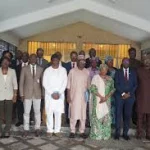In a landmark effort to modernise classroom learning and strengthen agricultural education, the Adamawa State Universal Basic Education Board (ADSUBEB), in partnership with the Universal Basic Education Commission (UBEC), has launched the Agricultural Education Training Programme (AETP) for public schools across the state.
The initiative is aimed at equipping teachers with contemporary knowledge and hands-on skills that will help improve how agriculture is taught in schools while fostering sustainable farming practices. The programme forms part of Adamawa State’s broader strategy to upgrade its basic education curriculum and strengthen food production systems through knowledge transfer.
At the heart of the programme is the training of 360 staff members drawn from 120 public schools spread across the 21 local government areas of the state. These teachers, following the training, are expected to return to their schools better prepared to deliver meaningful agricultural education that combines both theory and practice.
Speaking during the launch held in Mubi, the Desk Officer for Agricultural Education, Mal. Hussaini Musa, described the initiative as a turning point for education and agriculture in Adamawa State.
“This initiative empowers both teachers and students to drive agricultural innovation, development, and sustainability,” Musa said. He commended Governor Ahmadu Umaru Fintiri and the Executive Chairman of ADSUBEB, Dr. Murtala Umar Babayi, for their leadership and support in making the programme a reality.
Musa also encouraged participants to put their training to use in their classrooms and communities. “As we conclude this training, I urge each of you to apply the knowledge and skills acquired. The future of agricultural development in Adamawa State rests on our collective dedication and action,” he stated.
The AETP is expected to deliver long-term benefits, including improved teacher capacity, increased student interest and competence in agriculture, and a ripple effect of sustainable farming practices in local communities. It is part of an ongoing effort to align public education with the state’s development goals in food security, youth empowerment, and innovation in agriculture.










